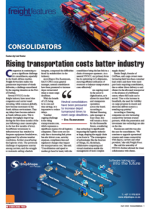Congestion is continuing to pose a significant challenge for consolidators, especially in the South African market. Freight forwarders realise the paramount importance of timely deliveries, a challenge exacerbated by the ongoing situation at the Port of Durban.Several NVOCCs in the freight industry have noted that congestion and carrier vessel rerouting, while common globally, have become customary in the South African environment. They say delays have become endemic at South African ports. This is despite throughput improving during the first three months of the year following a near catastrophe in the last few months of 2023. Insufficient investment in infrastructure has resulted in frequent equipment breakdowns, aggravated by adverse weather conditions, further exacerbating the logistics crisis. The persistent challenge of equipment scarcity among carriers, and the struggle to maintain sailing schedule integrity, compound the difficulties faced by stakeholders in the industry.According to Eva Rasmussen, SACO CFR's ocean general manager, neutral consolidators have been pressured to increase depot turnaround times to meet cargo deadlines.With the benefit of LCL being in its cost and time savings, it is imperative to reduce delays."Another ongoing challenge is the rising transportation cost, which represents a significant expense for all logistics companies. These costs are not only due to increasing fuel prices but also labour costs, security expenses, compliance fees and regulatory changes that impact the transportation cost," she said. "Consolidations and speed to market go hand in hand, with the consolidator being the last link in a chain of transport operators. As a neutral NVOCC, our primary focus lies in optimising LCL shipments, ensuring efficient utilisation of resources to balance transportation costs effectively."An ongoing trend in the sector is digitalisation, as it allows for more f luid and transparent operations across the board. According to Michael Henning, sales manager at Easy Clear, this will remain a focus for the foreseeable future, considering that technology is significantly impacting the logistics industry at large, shaping the supply chain as we know it. "The convergence of technologies like the Internet of Things, 5G, blockchain, collaborative computing and virtual simulation enable the management of more complex supply chains."Renko Bergh, founder of CtrlFleet, said cargo owners were increasing their less-than-container load orders and there were more part loads requiring consolidation, due to either direct delivery to end clients via the allocated transporter or the absence of a fulfilment centre, where full loads can be stored. “Due to the increase in breakbulk, the need for visibility on cargo progress in transit and electronic delivery notes is a trending top priority.”According to Henning, companies are also increasing connectivity between trusted partners, while the penetration and investment into technology are also on the rise.Rasmussen said this was also the case for consolidators. "We continue to upgrade operational systems and create connectivity with depots, carriers and other providers," she told Freight News.She said the neutrality of NVOCCs further allowed for closer collaboration with clients.

